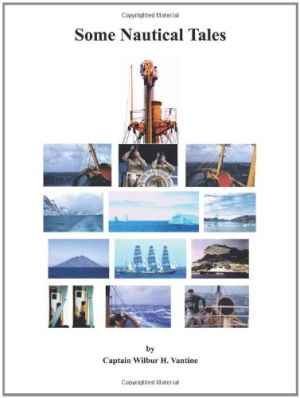Some Nautical Tales
Wilbur H. Vantine writes about the ebb and flow of life at sea in his highly personal story, Some Nautical Tales.
Vantine begins the book with his enlistment in the merchant marine during World War II, where he advanced quickly to become a ship’s captain before his thirtieth birthday. Although the activity of the merchant marines gradually declined after the war, Vantine’s ships delivered cargo to numerous ports in Europe, the Middle East, and Asia. The memoir, written primarily for family members, contains a combination of statistical information taken from logbooks and remembrances of camaraderie aboard ship, difficulties encountered with cargo and crew, and sightseeing adventures during shore leave.The memoir ends at the time when the author leaves the merchant marine in 1957 to begin a new career piloting ships through the Panama Canal.
Vantine joined the merchant marine to avoid being drafted into the army, and he served as an ensign in the Navy Reserve during the war. Believing that his time in the merchant marines fulfilled his armed-services duty, the delivery of a draft notice in 1951 surprised him. He writes, “My WWII service in the Merchant Marine, starting in 1943, did not count for anything. We were considered to be draft dodgers.” The Alumni Association of the Merchant Marine Academy contacted the draft board on the author’s behalf and convinced them that his World War II service exempted him from further military service.
The author explains that during his service in the merchant marine, he didn’t want to remind the older men under his command of his comparative youth. He was conscious of looking younger than his real age, especially since “ship Captains were frequently referred to by the crew members as ‘the Old Man.’”
Once, when Vantine’s ship was carrying a full cargo of coal to Korea, rising temperatures in the storage holds caused fires to erupt. Unable to take refuge near land, Vantine tried covering ventilation ports in the storage spaces to lower oxygen levels. When that tactic failed, he radioed for permission to douse the fires with seawater. His company’s reply that seawater would ruin the coal for its intended purpose, conversion to coke, only served to complicate the emergency.
The author succeeds in presenting a highly personal account of his experiences at sea, and he includes interesting details about shipping operations in the mid-twentieth century. But he writes primarily in passive voice, distancing readers from feeling the immediacy of his stories. Vantine’s colloquial style often deviates from the rules of syntax, grammar, and punctuation, making the text less than polished. Misplaced periods and commas, inconsistent tense usage, clichés, multiple exclamation points, and repetition of detail abound.
Color photographs enhance the appeal of the cover. Photographs taken by the author, and some gathered from the Internet, add visual interest throughout the book.
Despite its flaws, this memoir, while intended for family members, may interest readers fascinated by seagoing vessels and the perils and adventures their crews encounter.
Reviewed by
Margaret Cullison
Disclosure: This article is not an endorsement, but a review. The publisher of this book provided free copies of the book and paid a small fee to have their book reviewed by a professional reviewer. Foreword Reviews and Clarion Reviews make no guarantee that the publisher will receive a positive review. Foreword Magazine, Inc. is disclosing this in accordance with the Federal Trade Commission’s 16 CFR, Part 255.

